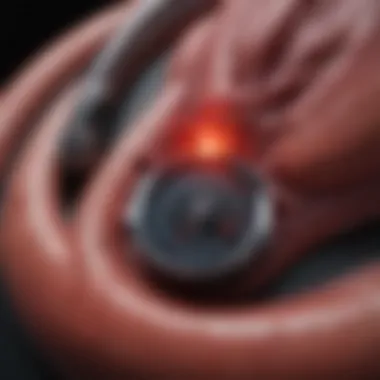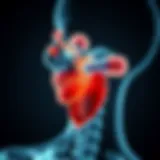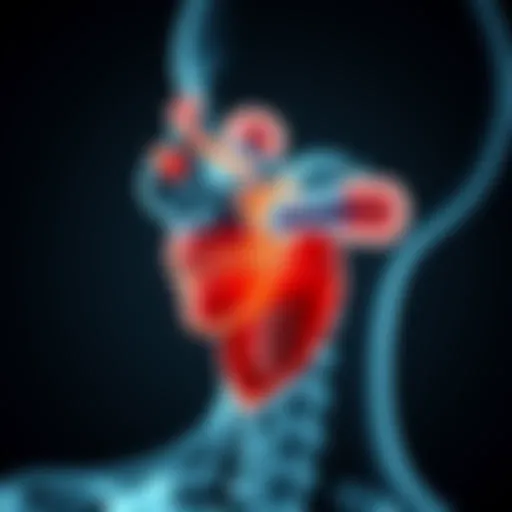Hypertension and Kidney Disease: A Complex Connection


Intro
Hypertension and kidney disease are two major health concerns that frequently coexist, resulting in significant medical challenges. Understanding their connection can lead to better treatment strategies and improve patient outcomes. This exploration will reveal the intricate relationship between these conditions, focusing on how kidney dysfunction can cause or exacerbate high blood pressure.
Kidney disease affects around 10% of the global population, and hypertension is a leading cause of mortality worldwide. Ironically, while hypertension's role in kidneys is well recognized, many fail to appreciate that the reverse is also true. The physiological mechanisms underlying this connection are complex, involving various factors such as fluid retention, hormonal imbalances, and endothelial dysfunction.
This article will cover crucial topics, including:
- The mechanisms linking kidney disease to hypertension
- The impact of elevated blood pressure on kidney function
- Strategies for managing hypertension in patients with renal issues
- Future directions for research in this critical area
By synthesizing various insights, our aim is to shed light on this important interrelation and to highlight the necessity of an integrated approach to treatment.
Prelude to Hypertension and Kidney Disease
Understanding the connection between hypertension and kidney disease is crucial for healthcare professionals and patients alike. Hypertension, or high blood pressure, is a common condition that can lead to severe complications if not managed properly. When it comes to the kidneys, they play a vital role in regulating blood pressure through fluid balance and electrolyte management. Thus, any dysfunction in kidney health can directly impact blood pressure levels.
Recognizing this connection is essential for effective diagnosis and treatment strategies. It allows for a more integrated health approach, ensuring that both hypertension and kidney function are monitored and addressed simultaneously.
Defining Hypertension
Hypertension is a medical condition characterized by consistently elevated blood pressure readings. Blood pressure is measured in millimeters of mercury (mmHg) and is represented with two numbers: systolic (pressure during heartbeats) and diastolic (pressure between heartbeats). The general guideline is that a normal blood pressure reading is below 120/80 mmHg. When blood pressure readings exceed these levels, particularly if it reaches 140/90 mmHg or higher, it is classified as hypertension.
Hypertension often goes unnoticed, earning the moniker "silent killer" due to its lack of symptoms. Over time, unmanaged high blood pressure can lead to serious health issues, such as heart disease and stroke. In this realm, understanding the severity and implications of hypertension is foundational in developing preventive and therapeutic measures.
Understanding Kidney Disease
Kidney disease refers to conditions that affect the kidneys' function, primarily their ability to filter waste from the blood. Chronic Kidney Disease (CKD) is one of the most common forms, where kidney function gradually declines over time. Other types include Acute Kidney Injury, which occurs suddenly, and Polycystic Kidney Disease, a genetic disorder characterized by fluid-filled cysts in the kidneys.
The kidneys are essential organs involved in regulating various bodily functions. They help maintain fluid balance, electrolyte levels, and blood pressure, alongside the excretion of waste products. When kidney function diminishes, these processes are hampered, leading to a cascade of health issues, including hypertension.
The Interrelationship Between Hypertension and Kidney Disease
The relationship between hypertension and kidney disease is reciprocal; they influence one another in significant ways. When kidneys are damaged, they struggle to excrete excess sodium and water, which can raise blood pressure. This creates a cycle where the kidneys continue to be harmed by hypertension, leading to further deterioration of their function.
Research shows that early detection and management of hypertension can slow the progression of kidney disease, presenting a compelling case for healthcare providers to monitor blood pressure closely in patients with renal impairments. It is a complex interplay necessitating a comprehensive understanding of both conditions to optimize patient outcomes and healthcare strategies.
Pathophysiology of Hypertension in Kidney Disease
Pathophysiology plays a crucial role in understanding how kidney disease can lead to hypertension. This relationship highlights the mechanisms that contribute to the development and progression of high blood pressure as a complication of renal impairment. Understanding these mechanisms offers insights into potential treatment and management strategies, which can ultimately improve patient outcomes.
Mechanisms of Blood Pressure Regulation
Blood pressure regulation is a complex physiological process. The body utilizes various systems to maintain an adequate blood flow and pressure, particularly to vital organs. One of the primary mechanisms involves the balance between cardiac output and systemic vascular resistance. Several factors influence this balance, including heart rate, blood volume, and vascular tone.
In individuals with kidney disease, these regulatory mechanisms may become impaired. For instance, diminished renal function can alter fluid equilibrium, leading to excess fluid retention. This retention increases blood volume, thereby raising blood pressure. Moreover, the kidneys play a pivotal role in producing renin, an enzyme that regulates blood pressure. Reduced renal function can lead to abnormal renin production, exacerbating hypertension.
Renin-Angiotensin-Aldosterone System
The Renin-Angiotensin-Aldosterone System (RAAS) is vital in controlling blood pressure. In renal impairment, the kidneys may release an excess of renin due to reduced blood flow or other triggers.
This increase results in elevated levels of angiotensin II, a potent vasoconstrictor that narrows blood vessels, subsequently raising blood pressure. Furthermore, angiotensin II stimulates the secretion of aldosterone, promoting sodium and water reabsorption in the kidneys. This mechanism reinforces the cycle of volume overload and hypertension, making the management of blood pressure particularly challenging in patients with kidney disease.
Role of Sodium and Fluid Balance


Sodium and fluid balance are crucial in managing hypertension in kidney disease. Kidneys typically regulate sodium levels by filtering it out of the blood. However, in chronic kidney disease or acute injury, this regulation can fail.
Excess sodium intake can lead to fluid retention, contributing to hypertension. Patients often need to monitor their dietary sodium to maintain a healthy blood pressure. Additionally, effective fluid management is necessary to avoid overload, which can strain the cardiovascular system.
"Understanding the connection between fluid and salt intake and hypertension is essential for effective disease management in renal patients."
In summary, the pathophysiology of hypertension in kidney disease involves intricate processes that affect blood pressure regulation. Recognizing the mechanisms at play—like the RAAS and fluid balance—arms healthcare providers with the knowledge needed to tailor interventions effectively. Further exploration into these areas can ultimately lead to improved management strategies for individuals affected by both kidney disease and hypertension.
Types of Kidney Disease Affecting Blood Pressure
Understanding the types of kidney disease that affect blood pressure is crucial for comprehending the broader implications of hypertension in patients with renal impairments. Each type of kidney disease carries its own unique pathological features and impacts the cardiovascular system in distinct ways. Knowing these types not only aids in diagnosis, but also informs treatment strategies, allowing for better patient outcomes. The interdependence between kidney function and systemic blood pressure regulation makes this understanding particularly vital for healthcare practitioners.
Chronic Kidney Disease
Chronic Kidney Disease (CKD) is characterized by a gradual loss of kidney function over time. This condition is particularly common among older adults and can be caused by diabetes, hypertension, or glomerulonephritis. As kidney function declines, the body's ability to filter excess sodium and fluids diminishes, often resulting in elevated blood pressure.
Patients with CKD frequently exhibit a complicated relationship with hypertension. High blood pressure can exacerbate kidney damage, creating a vicious cycle that leads to further renal impairment. Management often includes medications such as angiotensin-converting enzyme (ACE) inhibitors, which help lower blood pressure and provide renal protective effects. The earlier the diagnosis of CKD and associated hypertension, the better the long-term prognosis.
"Chronic kidney disease requires vigilant monitoring of blood pressure to prevent further complications that may arise from untreated hypertension."
Acute Kidney Injury
Acute Kidney Injury (AKI) represents a sudden decline in kidney function, often reversible if detected early. Causes of AKI may include dehydration, certain medications, or severe infections. Unlike CKD, AKI occurs quickly and can lead to fluctuation in blood pressure.
During an episode of AKI, blood pressure changes may be reflective of the underlying cause. For example, dehydration can lead to low blood pressure, while inflammation within the kidneys may cause elevations. Detecting AKI early can prevent long-term damage and mitigate hypertensive episodes.
Management strategies often focus on treating the underlying cause while also monitoring blood pressure closely. If hypertension persists following recovery from AKI, longer-term strategies will need to be reconsidered.
Polycystic Kidney Disease
Polycystic Kidney Disease (PKD) is a genetic disorder marked by the growth of numerous cysts in the kidneys. These cysts can impair kidney function and lead to hypertension due to multiple factors, including the effects on blood vessel structure and renal blood flow. Patients with PKD generally face an increased risk of high blood pressure at an earlier age compared to the general population.
Effective management of hypertension in PKD often employs a multifaceted approach, including lifestyle changes, dietary modifications, and possibly medications. Controlling blood pressure can significantly slow the progression of kidney disease in these patients. Understanding the relationship between PKD and hypertension is essential for optimizing patient care and enhancing quality of life for those affected.
Overall, recognizing the various types of kidney disease that influence blood pressure allows for a more integrated approach in managing both hypertension and renal health.
Clinical Implications of Hypertension in Kidney Disease
Understanding the clinical implications of hypertension in kidney disease is critical for both healthcare providers and patients. Hypertension and kidney disease often go hand in hand, making it essential to recognize this relationship for effective treatment and management. The overlapping nature of these conditions requires careful monitoring and a comprehensive approach. This section discusses diagnosis and screening methods, the risks of uncontrolled hypertension, and the long-term outcomes for patients who suffer from both conditions.
Diagnosis and Screening
The diagnosis of hypertension in individuals with kidney disease involves specific screening protocols tailored to detect elevated blood pressure. Regular monitoring of blood pressure levels is crucial. Healthcare professionals often utilize 24-hour ambulatory blood pressure monitoring alongside traditional methods. This helps in identifying changes that may go unnoticed during standard office visits.
- Assessment of renal function: Effective diagnosis includes evaluating renal function through blood tests. Common markers are serum creatinine and glomerular filtration rate (GFR).
- Patient history: A thorough patient history is important, focusing on any pre-existing conditions that may influence blood pressure.
- Lifestyle factors: Awareness of lifestyle factors like diet, exercise, and medication adherence also plays a role in diagnosing hypertension effectively.
Based on these assessments, a tailored approach can be developed, enhancing patient outcomes by addressing hypertension early.
Risks Associated with Uncontrolled Hypertension
Uncontrolled hypertension poses serious risks to patients with kidney disease. This situation can lead to rapid progression of renal impairment and an increased likelihood of cardiovascular diseases. Some key risks include:
- Kidney damage: Elevated blood pressure can cause further injury to the nephrons, leading to chronic kidney disease progression.
- Cardiovascular complications: Hypertension is a major risk factor for heart failure, myocardial infarction, and cerebrovascular accidents.
- End-stage renal disease: The risk of developing end-stage renal disease increases, necessitating dialysis or transplantation.


It is imperative for patients to understand these risks to motivate adherence to treatment regimens.
Long-Term Outcomes of Patients with Coexisting Conditions
Research indicates that managing hypertension effectively in patients with kidney disease can significantly improve long-term outcomes. Early and aggressive treatment can slow the progression of both kidney disease and hypertension.
- Improved quality of life: Patients who maintain blood pressure control often report a better quality of life and lower rates of complications.
- Survival rates: Studies show that individuals managing both conditions have higher survival rates compared to those who do not adequately control their hypertension.
- Reduced healthcare costs: Effective management reduces the need for advanced medical interventions, thereby lowering overall healthcare costs.
Regular follow-ups and lifestyle modifications facilitate better management strategies.
"Regular monitoring of hypertension is crucial in patients with kidney disease to prevent further complications and enhance survival rates."
Therapeutic Approaches to Manage Hypertension in Kidney Patients
Managing hypertension in patients with kidney disease is crucial due to the interconnected nature of these conditions. Effective therapeutic approaches can significantly reduce health risks, improve the quality of life, and prevent the progression of chronic kidney disease. A comprehensive understanding of these strategies enhances patient care and promotes adherence to treatment regimens. The following sections will elaborate on pharmacological interventions, non-pharmacological strategies, and integrative approaches to provide a holistic view of managing hypertension in individuals affected by kidney disease.
Pharmacological Interventions
Pharmacological interventions are often the first line of treatment for hypertension in kidney patients. These medications not only aim to lower blood pressure but also target the underlying mechanisms of kidney disease. Key classes of antihypertensive drugs include:
- Angiotensin-Converting Enzyme (ACE) Inhibitors: Agents like Lisinopril or Ramipril work by relaxing blood vessels and reducing workload on the heart.
- Angiotensin II Receptor Blockers (ARBs): Medications such as Losartan and Valsartan are effective alternatives for patients who cannot tolerate ACE inhibitors.
- Calcium Channel Blockers: Drugs like Amlodipine help to relax and widen blood vessels, lowering blood pressure.
- Diuretics: These are prescribed to help reduce excess fluid and sodium in the body, which can alleviate blood pressure.
The choice of pharmacological treatment may depend on various factors, including the patient’s specific health status, other comorbidities, and potential drug interactions. Monitoring and adjusting dosages are central to ensuring optimal outcomes.
Non-Pharmacological Strategies
Non-pharmacological strategies play an essential role in managing hypertension, particularly in kidney patients. They emphasize lifestyle changes that can reduce blood pressure and support kidney health. Some effective approaches include:
- Dietary Modifications: A diet low in sodium and rich in fruits, vegetables, and whole grains, like the DASH diet, can be beneficial.
- Regular Physical Activity: Engaging in consistent moderate exercise can assist in weight management and blood pressure control.
- Stress Management Techniques: Practices such as yoga and meditation can help lower stress levels, positively impacting hypertension.
- Weight Management: Maintaining a healthy weight can directly influence blood pressure levels.
Research shows that combining these strategies with pharmacological treatments can significantly enhance overall management and patient outcomes. It is vital for healthcare providers to educate patients on these non-pharmacological options and encourage adherence.
Integrative Approaches to Patient Care
An integrative approach to patient care involves combining conventional therapies with complementary practices to optimize health. This strategy focuses not only on the physical aspects of hypertension and kidney disease but also on emotional, psychological, and social factors affecting the patient’s well-being. Important elements of integrative care include:
- Patient Education: Empowering patients with knowledge about their conditions fosters better self-management.
- Shared Decision-Making: Engaging patients in discussions regarding treatment options ensures that their values and preferences are respected.
- Support Systems: Establishing support groups or counseling can provide emotional support and promote healthy behaviors.
By addressing all facets of patient health, including holistic aspects, integrative approaches create a more inclusive treatment plan, enhancing outcomes and resilience in individuals struggling with hypertension and kidney disease.
Integrating pharmacological treatments, lifestyle changes, and holistic patient care is vital for an effective blood pressure management strategy in kidney disease.
Monitoring and Follow-Up Care
The management of hypertension related to kidney disease necessitates diligent monitoring and follow-up care. Regular evaluation is essential for understanding the progression of both hypertension and renal impairment. This vigilance allows healthcare providers to tailor treatment strategies effectively, ensuring that patients achieve optimal health outcomes.
Importance of Regular Monitoring
Regular monitoring of blood pressure and kidney function is fundamental in managing patients with hypertension stemming from kidney disease. Elevated blood pressure can signify worsening renal function, while deteriorating kidney health can exacerbate hypertension. Consistent tracking aids in identifying trends, allowing for timely interventions.
Key benefits of regular monitoring include:
- Early Detection: Significant changes in blood pressure or kidney function can be detected early, preventing complications.
- Personalized Treatment Plans: Data obtained through monitoring can help customize medications and lifestyle recommendations for each patient.
- Improved Patient Outcomes: Proactive management reduces the risk of cardiovascular events and slows the progression of kidney disease.


Healthcare providers should focus on both systolic and diastolic pressures and use methods such as urine tests to assess kidney function.
Adjusting Treatment Based on Patient Response
Adapting treatment regimens based on patient response is a critical element in managing hypertension in those with kidney disease. Each patient may react differently to medications and lifestyle changes. Regular follow-ups provide the data needed to make informed adjustments.
Considerations for adjusting treatment include:
- Medication Efficacy: If a patient experiences persistent hypertension despite treatment, alternative medications may be required. Angiotensin-converting enzyme inhibitors and diuretics are often employed, but individual responses can vary.
- Monitoring Side Effects: Tracking any adverse reactions to medications is vital, especially in patients with compromised kidney function. Adjustments may be necessary to minimize side effects while still managing blood pressure effectively.
- Addressing Comorbidities: Many patients have additional health issues that affect treatment. A holistic approach considers these comorbid conditions to optimize overall health.
"Effective management of hypertension in kidney disease requires continuous assessment and adjustment, not just a one-time approach."
By conducting regular evaluations and adjusting treatment accordingly, healthcare professionals can significantly improve the quality of care. This proactive approach also engages patients in their health journey, fostering better adherence to treatment plans and promoting overall wellness.
Innovative Research and Future Directions
In the landscape of medicine, research is a cornerstone that fuels innovation. The field of hypertension, particularly in relation to kidney disease, is no exception. Understanding the connection between these two conditions is essential for developing effective therapeutic approaches. Innovative research illuminates uncharted territories and findings could markedly improve patient care by identifying precise mechanisms of action. Key areas in this research focus include novel therapies, genetic factors, and the integration of technology into treatment regimes.
Emerging Therapies in Hypertension Management
Emerging therapies in hypertension management are gaining significant attention. Traditional treatment options focus on controlling blood pressure numbers. New research aims to go beyond the mere control of symptoms to addressing underlying causes associated with kidney disease.
Some of the noteworthy areas of exploration include:
- Mineralocorticoid Receptor Antagonists (MRAs): These medications show promise in patients with resistant hypertension related to kidney dysfunction.
- Sodium-Glucose Co-Transporter 2 (SGLT2) Inhibitors: Originally designed for diabetes management, these drugs have shown potential in improving kidney function while concurrently managing blood pressure.
- Renal Denervation: This technique involves catheter-based interventions that aim to reduce sympathetic nervous system overactivity, which is prevalent in many patients with kidney disease.
Research continues to explore the efficacy and safety of these and other therapies, indicating a shift towards more individualized patient care strategies.
Genetic Insights in Hypertension and Kidney Disease
The intertwining of genetics with hypertension and kidney disease offers a fresh perspective on understanding these conditions. Genetic predisposition plays a crucial role in how individuals respond to high blood pressure. Recent findings suggest that certain gene polymorphisms might increase susceptibility to hypertension in patients with underlying kidney issues.
Key points to understand include:
- Familial Patterns: Recognizing hereditary patterns can guide screening efforts, particularly in populations known for high prevalence.
- Biomarkers: Identifying genetic markers may help in the development of personalized medicine approaches. Such advances could lead to tailored interventions based on individual genetic profiles.
- Understanding Pathways: Genetic studies can help unravel the complex regulatory pathways associated with hypertension and kidney disease, leading to potential new targets for drug development.
Ongoing research is vital. It opens new pathways for understanding the biochemical interactions between the kidneys and blood pressure regulation.
"Understanding the genetic component can help tailor hypertension treatment for kidney patients, leading to better health outcomes."
As research progresses, the emphasis on both therapeutic innovation and genetic understanding may pave the way for holistic care models that improve the quality of life for individuals suffering from these intertwined conditions.
Epilogue
The conclusion section is vital as it wraps up the key insights presented throughout this article. It serves to consolidate understanding about the connection between hypertension and kidney disease. This relationship is significant due to its widespread implications for health care and patient management. The dynamic interplay between these two conditions emphasizes the need for a holistic view in treatment approaches.
Recap of Key Points
To summarize, several major points emerge from our exploration:
- Hypertension is often linked to kidney disease, with both conditions influencing each other closely.
- The pathophysiology reveals intricate mechanisms where renal health deteriorates, leading to increased blood pressure.
- We discussed different types of kidney diseases, such as Chronic Kidney Disease, Acute Kidney Injury, and Polycystic Kidney Disease, all of which can exacerbate hypertension.
- A key clinical implication includes the diagnosis and screening of hypertension in patients with kidney issues, highlighting the necessity for regular monitoring.
- Treatment strategies must include pharmacological interventions, as well as non-pharmacological methods like lifestyle changes to better manage blood pressure.
- The role of ongoing research continues to be paramount for understanding and improving the management of these intertwined diseases.
This recap indicates not only the complexities involved but also the pressing need for careful consideration when managing patients with coexisting hypertension and kidney disease.
The Importance of Ongoing Research
Ongoing research is crucial in advancing our understanding of hypertension and kidney disease. As we uncover more about their connection, several areas warrant further exploration:
- Emerging therapies should be evaluated continually to find novel solutions that improve patient outcomes.
- Genetic insights will potentially reveal predispositions to either condition. Understanding these links can alter treatment approaches and enhance preventive strategies.
- Continuously refining diagnostic methods and screening protocols can lead to better early intervention, which is critical for managing chronic conditions effectively.
Overall, the significance of ongoing research cannot be understated. It is through these explorations that healthcare can evolve to meet the needs of those affected by hypertension and kidney disease. Integrating research findings with clinical practice can lead to more precise and personalized treatment plans.







